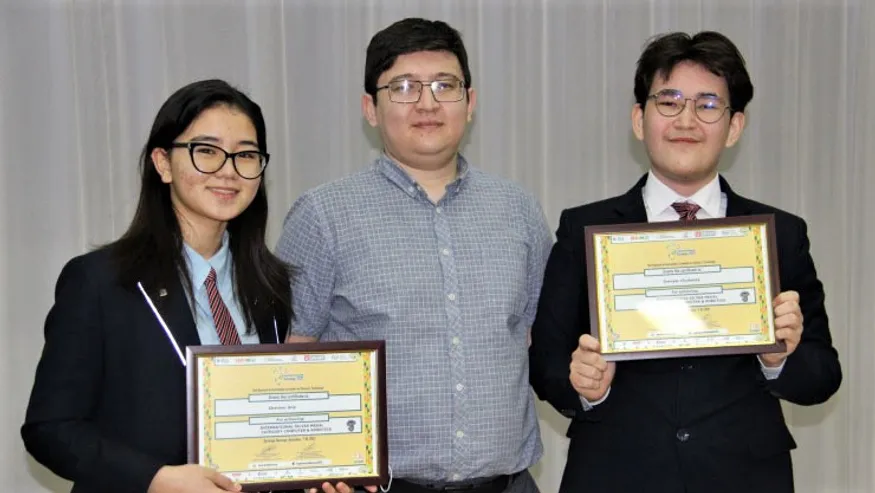Two school students have developed a keyboard for people with visual impairments and won a silver medal at an international competition. A group of researchers from Kazakhstan found the solution to one of the 7 Millennium Math Problems, while a scientist developed a unique method of treating Type 1 diabetes.
Keyboard for the visually impaired and the blind
Zhannur Ayip and Daniyar Chutenev won the silver medal in the Computer and Robotics category at the Expo-Sciences Mexico. School students from Kazakhstan beat more than 60 teams from 17 countries with their Braille Board - a keyboard for the visually impaired and blind, which they worked on for a year.
"Our device consists of six buttons, just like the six dots used in the Braille system. With different combinations, you can enter letters or symbols on a computer. We created the boards ourselves. In the future, we plan to get a patent, as it is a truly unique project."
The students consider the second place to be fair. "There is always room for improvement. In our category, first place went to students from Bosnia and Herzegovina." Currently, Zhannur is also creating an app for people with epilepsy. The app is aimed at detecting alarming symptoms in a patient and notifying people close to the patient about his or her condition.
Solution found to one of the 7 Millennium Prize Problems
The seven Millennium Prize Problems are the most important unsolved problems in mathematics. A private nonprofit foundation Clay Mathematics Institute challenged the mathematical community in the year 2000 to solve these problems and get a $1 million reward for it. Out of 7 problems, only one has been solved so far: Russian mathematician Grigory Perelman managed to solve the Poincaré conjecture in 2010.
As a result of 4 years of work, the group of researchers from Kazakhstan plans to present the solution to one of the 7 Millennium Math Problems on March 7 at Expo 2020 Dubai. The problem they solved is the P versus NP problem: If the solution to a problem is easy to check for correctness, must the problem be easy to solve? The P versus NP problem is a major unsolved problem in computer science. It asks whether every problem whose solution can be quickly verified can also be solved quickly.
The group of Kazakhstan’s researchers was led by Kazakh scientist B.K. Sinchev, Doctor of Technical Sciences, Professor at the International University of Information Technologies, one of the developers of automated onboard control systems of the Buran spacecraft.
A successful solution to this problem will change the future of all mankind and dramatically affect the speed with which information technology is used in areas such as logistics, genetics, cryptography, encryption, online booking, creation of search engines, and medicine. An agreement has already been signed on the use of the algorithm by the experts of one of the World Institutes of Oncology. The authors of the project have received patents, including USPTO patents for their solution to the P vs NP problem.
A unique method of treating diabetes
As of today, type 1 diabetes has no cure. Patients are supported with insulin therapy. Scientists around the world are working on creating cells for potential transplantation. Bakhytzhan Alzhanuly, a scientist from the Institute of Molecular Biology and Biochemistry, has developed a new method of treating Diabetes that has never been used in science.
Bakhytzhan has developed unique cells to treat type 1 diabetes with the help of genome editing. Transplantation of these cells will allow the pancreas not only to produce insulin but also to independently regulate its level in the body.
Bakhytzhan began his research back in 2018 in Canada and completed it in Almaty at the Aitkhozhin Institute of Molecular Biology and Biochemistry last year. Work to improve the existing treatment protocols is currently underway.
